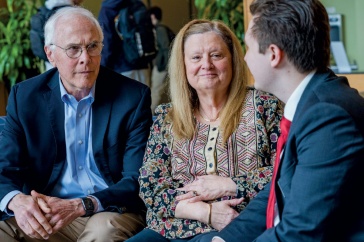The University of New Hampshire is one of three universities tapped by a White House task force to do further research related to ending campus sexual assault. UNH’s Prevention Innovations was identified in “Not Alone: The First Report of the White House Task Force to Protect Students from Sexual Assault.” The center will design and implement a training program, in cooperation with campus-based practitioners from around the country and the university’s Sexual Harassment and Rape Prevention Program (SHARPP).
Prevention Innovations is a collaboration between researchers and practitioners that develops, implements and evaluates cutting-edge programs, policies and practices that will end violence against women. Originally founded in 1987, SHARPP provides support services to survivors of sexual assault, relationship abuse and stalking and their allies, as well as education and outreach to the greater university community.
The White House research will be led by Sharyn Potter, associate professor of sociology and co-director of Prevention Innovations. “The specific research will look at how presenting the same information using different delivery methods (online, in a class, via the web, in residence halls, etc.) impacts what students remember and how they use the information over time,” Potter explained.
“This is a great honor for Prevention Innovations and for the university overall,” said Jane Stapleton, co-director of UNH’s Prevention Innovations. “We are seen as leaders in the effort to end violence against women and the programs that have come out of Prevention Innovations have been proven to make a difference.”
The task force report also highlights Bringing in the Bystander, a university prevention program that emphasizes a bystander approach and assumes that everyone has a role to play in ending violence against women. This program was developed and evaluated by Prevention Innovations researchers Victoria Banyard and Mary Moynihan, and the former SHARPP director, Elizabethe Plante. It has been adapted and continues to be evaluated by more than 50 colleges and universities in the U.S. and Canada, and it has been piloted for the U.S. Army in Europe.
Read the White House task force report here.
Originally published by:
UNH Today
-
Written By:
Staff writer | Communications and Public Affairs

















































